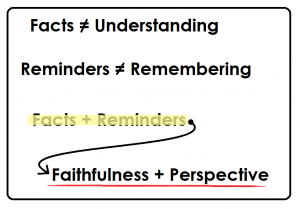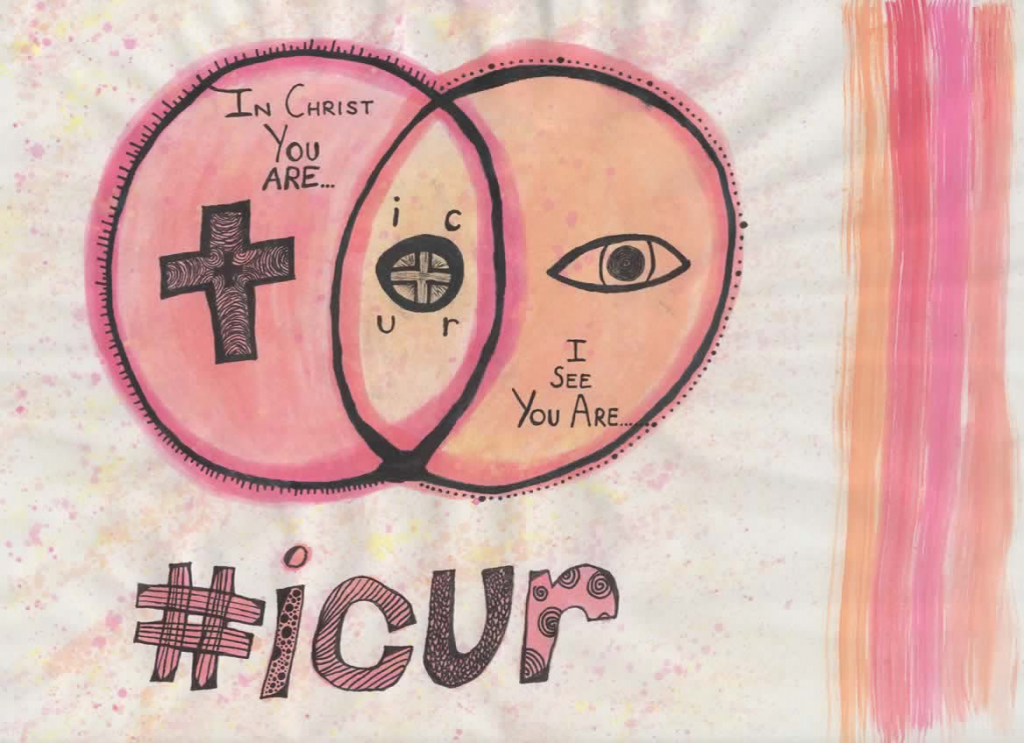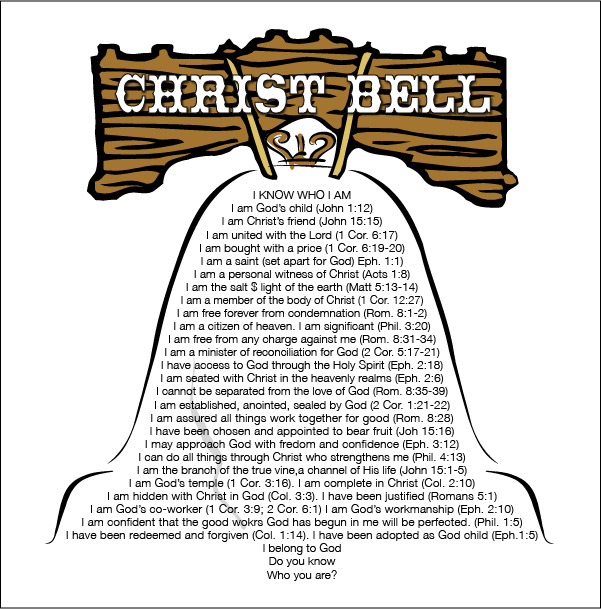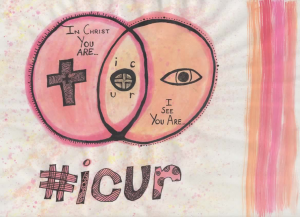
Teresa, a saint with her love and her doubts, said it best:
“We can do no great things, only small things with great love.”
Perhaps you and I can’t create a culture of good news, good works, and goodness found in Christ (though isn’t that the Kingdom?), but you and I can do small things with great love. And perhaps that is all we need.
Now what?
~:~
This is how I ended my last post on icur, icur: The Why– click here to check it out, because I’m moving forward with the assumption that you’ve read it. (Though I hear a voice from childhood echoing in the back of my brain: “Never Assume…..”)
The basic premise of the last post was outlining our problems with self-image and self-esteem, discussing understanding of our identity of Christ and suggesting possibilities for helping each other have a better idea of who we are. Well, instead of simply throwing out general ideas and hoping they’ll stick, I have a very specific focus in mind- icur.
icur stands for “In Christ You Are” among many other things… Technically, as you nit-pickers out there will say, the acronym should be ICYR, but there’s a lot going on here. Let me back up.
Journey of Identity
 When I went to college in 2007, I had a whole bunch of questions. Where’s my next class? Will I pass this test? Where should I go to church? What makes me… me? While those other questions certainly popped up from time to time, that last one has stuck with me for, well, my whole life. But at college, I was no longer surrounded by family and friends, in regular activities and work, in familiar places and communities. I had to find new friends, new activities, new communities. There were a million possible options– the charismatic church or swing dancing club or going hiking with some guys or sitting in my room all alone… too often, I probably chose the last option. But each time something new came up, I questioned– “Is this me? Do I like this? Would I like this? Should I like this?” And if I said “No” or “I Don’t Know,” I stayed away. Certainly my introverted nature and other characteristics affected those decisions, and sometimes it was probably fine, but for the most part, I was afraid– I didn’t want to become some new person. I wanted to stay true to myself, to the core of my being.
When I went to college in 2007, I had a whole bunch of questions. Where’s my next class? Will I pass this test? Where should I go to church? What makes me… me? While those other questions certainly popped up from time to time, that last one has stuck with me for, well, my whole life. But at college, I was no longer surrounded by family and friends, in regular activities and work, in familiar places and communities. I had to find new friends, new activities, new communities. There were a million possible options– the charismatic church or swing dancing club or going hiking with some guys or sitting in my room all alone… too often, I probably chose the last option. But each time something new came up, I questioned– “Is this me? Do I like this? Would I like this? Should I like this?” And if I said “No” or “I Don’t Know,” I stayed away. Certainly my introverted nature and other characteristics affected those decisions, and sometimes it was probably fine, but for the most part, I was afraid– I didn’t want to become some new person. I wanted to stay true to myself, to the core of my being.
Around that time I started using this “core” language–  I even wrote about it in this post. Basically, I’ve always felt that there is a core to each person’s identity– throughout life, a person’s tastes, opinions, hobbies, activities, friends, etc. will change, but a few aspects (beliefs, personality, desires, etc.) will remain very much the same. Am I correct? I don’t know. I still wrestle with the idea… but I was trying to cling to something in a time of change, uncertainty, and confusion.
I even wrote about it in this post. Basically, I’ve always felt that there is a core to each person’s identity– throughout life, a person’s tastes, opinions, hobbies, activities, friends, etc. will change, but a few aspects (beliefs, personality, desires, etc.) will remain very much the same. Am I correct? I don’t know. I still wrestle with the idea… but I was trying to cling to something in a time of change, uncertainty, and confusion.
Then I got an email from a middle school student, a younger friend named Timothy that I’d been mentoring and hanging out with whenever I was back in town from college. It was somewhat out of the blue, with a short message and a interesting chunk of text pasted in the body. It was the Bell.

No, in case you were wondering, this isn’t a picture of my laptop. It’s the exact same version, but mine didn’t have the power of levitation…
It wasn’t quite as fancy as this one, just the text itself in the shape of a bell. A whole bunch of statements about your identity in Christ. I read through it a few times, and I was greatly encouraged by the message. I sent a short reply to Tim thanking him for the email– and then I printed out the bell in itty-bitty Times New Roman and cut out a square around it and taped the entire thing to my laptop, a Dell Latitude D630, right to the left of the touch pad.
That laptop lasted for almost my entire college career, and that bell remained taped there long after I stopped using it. Finally I removed it and put it in a box of mementos. But you know what’s funny? For years, it sat there, right under my left palm, completely forgotten and ignored. If someone saw my computer, they might have asked about it or just smiled. But for all the time I spent on my laptop, I hardly ever admired the list, perhaps only when the Internet was slow or I was waiting for my computer to turn on. It was a reminder that remained forgotten.
~:~
 Isn’t that true of so many things in life? A wedding ring. A Bible given as a gift. A photo. A letter. Even when those reminders are placed in spots of prime influence– your hand, your wallet, your nightstand– they can become just part of the background. Likewise, the amazing promises of our identity in Christ become ho-hum unsurprising facts. “Oh, sure, I’m a child of God. That’s cool.”
Isn’t that true of so many things in life? A wedding ring. A Bible given as a gift. A photo. A letter. Even when those reminders are placed in spots of prime influence– your hand, your wallet, your nightstand– they can become just part of the background. Likewise, the amazing promises of our identity in Christ become ho-hum unsurprising facts. “Oh, sure, I’m a child of God. That’s cool.”
 So, reminders don’t equal remembering and facts don’t equal understanding. Then what’s the point? Perspective and Faithfulness. Memorizing a list of facts won’t give you true understanding, but doing that together with a bunch of other things can help you gain a better perspective and foundation to build upon. Wearing your wedding ring for a few days isn’t going to make cleaning the dishes magically less of a chore, but a few days become a few weeks become a few months– and while it’s possible for the ring to become somewhat invisible, when you make a practice of putting it on or touching it or holding it during praying for your spouse, you can remember what it means. So Facts + Reminders can lead to Faithfulness & Perspective. And perspective is truth– “and the truth shall set you free.”
So, reminders don’t equal remembering and facts don’t equal understanding. Then what’s the point? Perspective and Faithfulness. Memorizing a list of facts won’t give you true understanding, but doing that together with a bunch of other things can help you gain a better perspective and foundation to build upon. Wearing your wedding ring for a few days isn’t going to make cleaning the dishes magically less of a chore, but a few days become a few weeks become a few months– and while it’s possible for the ring to become somewhat invisible, when you make a practice of putting it on or touching it or holding it during praying for your spouse, you can remember what it means. So Facts + Reminders can lead to Faithfulness & Perspective. And perspective is truth– “and the truth shall set you free.”
In Christ You Are
icur stands for In Christ You Are. There are hundreds of websites and books with different lists of “Who You Are In Christ”– some are more flowery than others, but most stick with basic ideas found in Scripture. Why do we have these lists? Because there are so many other statements about our nature, identity, and purpose floating around– through media, literature, conversations at work, thoughts at the back of your mind. So we need facts and reminders to help us gain perspective and continue faithfully in who we are.
In Christ You Are is also a statement in itself. It’s not just about the things that we become in Christ– a child of God, a soldier, etc.– or the things we get– righteousness, salvation, peace, etc.– but about the very essence of our being. So often we focus on what we should do, have, know– but sometimes we just need to be. So, despite your poor feelings of self-worth or fears about school or frustration or shame– In Christ You Are. It doesn’t matter what all the other voices say. In Christ, You Are. It’s phrased in this way because of all those voices that we hear through life. We hear (or intuit) someone saying, “You don’t work hard enough” (even though we are already working overtime and sleeping 4 hours at night). What we need is a voice much louder than that voice, sweeter and truer, to drown out the lies. We need a reminder like this, “In Christ, You find Rest for Your Soul.” Or, “In Christ, You have the Spirit of Power, Love, & Self-Control.” Or, “In Christ, You can Take Pride in yourself.” This doesn’t solve all your problems, but it gives your perspective.
And what’s great about this is that you can echo what you hear to those who need it– all people need to hear uplifting words, everyone needs a little perspective. And these statements are true for believers and are promises for those who have yet to place their trust in Christ. It’s good news for the whole world.
I See You Are
icur can also be reverse acronymized (and yes, that’s a word) to stand for “I See You Are” (once again, just like the U for You, the R stands for Are, you see?) This speaks once again to our issues of self-image and self-esteem. With all these conflicting voices, one of the worst comes from the mirror. When you look in the mirror in the morning or before going to bed (or any time during the day) it’s easy to focus on your problems. Dry skin. Acne scars. Need to shave. Need to lose more weight. Hair is out of place. Nose is too big. (By the way, these are all thoughts that I have from time to time– I’m with you in this struggle.)
 In response, there is the extreme action taken by some individuals of removing mirrors from schools or elsewhere to send the message– “You aren’t defined by the mirror– You are beautiful.” That’s great, but what if someone needed to check if they had spinach in their teeth?! But really… Can you go to the mirror and name the good things you see in yourself? Can you speak kind words to your soul– “I See You Are A New Creation” “I See You Are Talented” “I See You Are Special“? You might feel silly, but surely this is healthy self-medicating, for “Gracious words are like a honeycomb, sweetness to the soul and health to the body” (Proverbs 16:24, ESV). And imagine- what if you spoke these words to others? Can you even imagine?
In response, there is the extreme action taken by some individuals of removing mirrors from schools or elsewhere to send the message– “You aren’t defined by the mirror– You are beautiful.” That’s great, but what if someone needed to check if they had spinach in their teeth?! But really… Can you go to the mirror and name the good things you see in yourself? Can you speak kind words to your soul– “I See You Are A New Creation” “I See You Are Talented” “I See You Are Special“? You might feel silly, but surely this is healthy self-medicating, for “Gracious words are like a honeycomb, sweetness to the soul and health to the body” (Proverbs 16:24, ESV). And imagine- what if you spoke these words to others? Can you even imagine?
 I went to a conference recently where speakers encouraged us to call out the good things we see in other people. In many ways, doing this is like removing jewels from a dusty treasure chest– they’ve been there all along, but have been long since forgotten and held by such poor souls. And it doesn’t even have to be phrased in such a way– “In Christ You Are” or “I See You Are.” Even something like, “Hey, you’re awesome!” can be enough. We need these words and others need these words as facts and reminders to bring perspective and help us walk faithfully in our true identity in Christ.
I went to a conference recently where speakers encouraged us to call out the good things we see in other people. In many ways, doing this is like removing jewels from a dusty treasure chest– they’ve been there all along, but have been long since forgotten and held by such poor souls. And it doesn’t even have to be phrased in such a way– “In Christ You Are” or “I See You Are.” Even something like, “Hey, you’re awesome!” can be enough. We need these words and others need these words as facts and reminders to bring perspective and help us walk faithfully in our true identity in Christ.
Eye-Cure
icur also stands for Eye-Cure. As a child, I saw an episode of The Jetsons  where they had a bunch of strange glasses that let you see things differently– X-Ray, seeing people as aliens, infra-red, etc. I always thought that was so fascinating– to see things with a new perspective from just a pair of glasses. But times are changing– we don’t want glasses, we want a quick cure. We want a new drug to fix our problems. Well, I can’t promise this is the cure-all we’ve been waiting for– pretty sure the Cure came and left, but is still offering Himself to any who seek Him out.
where they had a bunch of strange glasses that let you see things differently– X-Ray, seeing people as aliens, infra-red, etc. I always thought that was so fascinating– to see things with a new perspective from just a pair of glasses. But times are changing– we don’t want glasses, we want a quick cure. We want a new drug to fix our problems. Well, I can’t promise this is the cure-all we’ve been waiting for– pretty sure the Cure came and left, but is still offering Himself to any who seek Him out.

But these practices I’m talking about, they are more vitamins (not those ones that have no effect, but the ones that are actually beneficial.) Speaking kind words to yourself and others. Reading about your true identity in Christ. Reflecting and meditating on these ideas. Alone they are nothing, but done in the company of many other good habits and practices, you can gain a better perspective of things. Likewise, this shouldn’t be done in isolation.
 In the image I painted above, the central icon is a cross within a circle and it was inspired by Catholic images of the Eucharist wafer. This represents the two crucial needs in this endeavor– Christ and Christ. First, just as in the Eucharist, Communion, the Lord’s Supper you actually “take” of the body and blood of Christ, for you to truly understand who you are in Christ, you need Christ. A relationship, faith, love, hope, discipline, growing understanding, daily reliance. Without Him, not only do you lose the “c” in icur, but in the end all you have is a list of maybes and wishes. This is all for His glory– because when we know who we are, we can know what we should be doing and we can do it. It’s like if you take on a job somewhere– unless you know how to get there and what to wear (let alone what your job is and what your responsibilities are), you can’t move forward. But once you know– then you can go and do and bring glory to Christ.
In the image I painted above, the central icon is a cross within a circle and it was inspired by Catholic images of the Eucharist wafer. This represents the two crucial needs in this endeavor– Christ and Christ. First, just as in the Eucharist, Communion, the Lord’s Supper you actually “take” of the body and blood of Christ, for you to truly understand who you are in Christ, you need Christ. A relationship, faith, love, hope, discipline, growing understanding, daily reliance. Without Him, not only do you lose the “c” in icur, but in the end all you have is a list of maybes and wishes. This is all for His glory– because when we know who we are, we can know what we should be doing and we can do it. It’s like if you take on a job somewhere– unless you know how to get there and what to wear (let alone what your job is and what your responsibilities are), you can’t move forward. But once you know– then you can go and do and bring glory to Christ.
 The second necessary element in this process is Christ. Not just a personal relationship with Christ, but also relationships within His Body. That’s also what I love about The Lord’s Supper / Eucharist / Communion– when you “partake” of it, you are doing it with the rest of the Christian family across the world and through all time. Not only do you take of the body, but you are part of the Body– and so we must pursue our identity in Christ along with others. Whether that means discussing your journey and struggles, sharing ideas and information, speaking words of encouragement and insight, or just confessing and praying for each other– or even just spending time with other believers, it all works together for your health and the health of others. icur is an Eye-Cure— it helps you see yourself for who you are and see others for all they are. But you have to take it daily, or else it’ll never work.
The second necessary element in this process is Christ. Not just a personal relationship with Christ, but also relationships within His Body. That’s also what I love about The Lord’s Supper / Eucharist / Communion– when you “partake” of it, you are doing it with the rest of the Christian family across the world and through all time. Not only do you take of the body, but you are part of the Body– and so we must pursue our identity in Christ along with others. Whether that means discussing your journey and struggles, sharing ideas and information, speaking words of encouragement and insight, or just confessing and praying for each other– or even just spending time with other believers, it all works together for your health and the health of others. icur is an Eye-Cure— it helps you see yourself for who you are and see others for all they are. But you have to take it daily, or else it’ll never work.
I also considered other variations on this theme. For example…
- i-cur- There are prolific hashtags found throughout social media with “dont cur,” meaning “I don’t care” or “I don’t cur,” which, according to Urban Dictionary means, “Used when your fed up with somebody, or just don’t care about what they’re talking about.” Well, perhaps we should care. Perhaps we should… cur. So we say icur, because we care about ourselves and care about others and who we are together.
- icur– A “cur” is a term for a breed of dog,
 but it is more often defined as an insult, either for dogs (“mongrel or inferior dog”) or people (“a surly or cowardly fellow.”) You see, the cur dog was originally bred for cattle driving– and was described as strong, fierce and extremely useful. But over time, the true identity of the cur was lost and replaced by a mutt mentality. Well, now it’s time to redeem the curs– I’m a cur and I am not useless– and neither are you!
but it is more often defined as an insult, either for dogs (“mongrel or inferior dog”) or people (“a surly or cowardly fellow.”) You see, the cur dog was originally bred for cattle driving– and was described as strong, fierce and extremely useful. But over time, the true identity of the cur was lost and replaced by a mutt mentality. Well, now it’s time to redeem the curs– I’m a cur and I am not useless– and neither are you! - iCur– The new Identity Cure from Apple. It comes in 4 colors and… …No.
“Alright Evan, so basically you think we should read about who we are in Christ and talk to other people about it. Is that it?”
Well, yes, and no. I have more specific ideas, but I will save them for the final post in this series. So the question I’d like you all to think about is this:
How? How do we do it?
Until next time… 🙂


